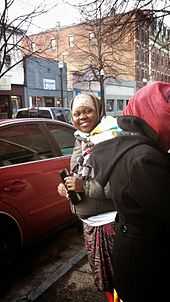History of the Somali Bantus in Maine
The Bantu are an ethnic group in Maine. As of 2012, there were around 1,000 Bantus in Lewiston.[1]
History

Bantus are a minority ethnic group in Somalia, a country largely inhabited by ethnic Somalis. They are the descendants of people from various Bantu ethnic groups originating from what are modern-day Tanzania, Malawi and Mozambique who were brought to Somalia as slaves in the 19th century. Bantus are ethnically, physically, and culturally distinct from Somalis, and have remained marginalized since their arrival in Somalia.[2][3]
During the Somali Civil War, which first began with the overthrow of the central government in 1991, many Bantus were evicted from their lands by various armed factions of Somali clans. Being visible minorities and possessing little in the way of firearms, the Bantus were particularly vulnerable to violence and looting by militiamen. Tens of thousands of Bantus fled to refugee camps in neighboring Kenya.[3]
In the year 2000, the United States classified the Bantu as a priority and began preparations to resettle an estimated 12,000 Bantu refugees in select cities throughout the U.S.[4] Most of the early arrivals in the United States settled in Clarkston, Georgia, a city adjacent to Atlanta. However, they were mostly assigned to low rent, poverty-stricken inner city areas, so many began to look to resettle elsewhere in the US, including Maine.[5]
The rise of working age immigrants coupled with government funded programs to re-establish a thriving economy in Lewiston are the two biggest reasons for the economic renaissance experiences in Lewiston-Auburn in the past decade.[6] In 2006, KPMG International released a study identifying the best places to do business around the world and ranked Lewiston as the best in New England.[7]
In June 2011, the Lewiston Sun Journal reported a growing number of Bantu recent immigrants earning high school diplomas, with more enrolling in local community colleges. The university students consist of both adult undergraduate and continuing education pupils, as well as high school graduates.[8][9]
Demographics
There are about 1,000 Bantu immigrants in Lewiston as of 2012.[1]
The Somali Bantu Community Mutual Assistance Association of Lewiston/Auburn Maine (SBCMALA) serves the local Bantu community, focusing on housing, employment, literacy and education, health, and safety matters. It also runs an agriculture program for resident Bantus.[4]
See also
References
- ↑ 1.0 1.1 Somali Bantu Foundation of Kansas, accessed 2012-09-12
- ↑ L. Randol Barker et al., Principles of Ambulatory Medicine, 7 edition, (Lippincott Williams & Wilkins: 2006), p.633
- ↑ 3.0 3.1 Refugees Vol. 3, No. 128, 2002 UNHCR Publication Refugees about the Somali Bantu
- ↑ 4.0 4.1 Somali Bantu Community Mutual Assistance Association of Lewiston/Auburn Maine
- ↑ Perceived Barriers to Somali Immigrant Employment in Lewiston - A Supplement to Maine’s Department of Labor Report
- ↑ "The Business Picture". Lewiston-Auburn Economic Growth Council. Retrieved 4 July 2014.
- ↑ "Global Study Touts Lewiston as a Business Opportunity Standout". City of Lewiston. Retrieved 4 July 2014.
- ↑ From refugee camp to cap and gown - Lewiston Sun Journal
- ↑ More Somali students graduate, find success - Lewiston Sun Journal
| ||||||